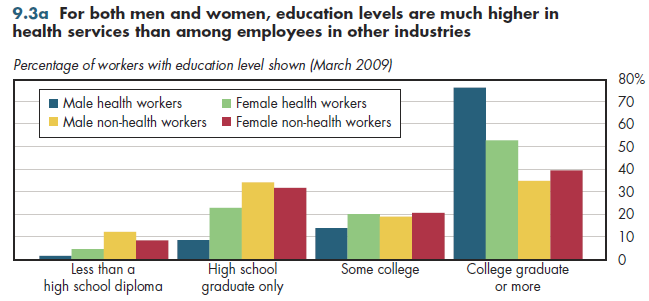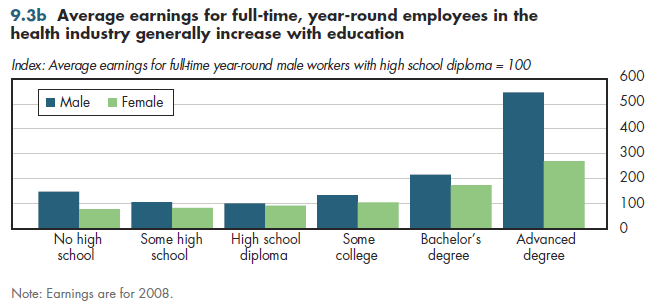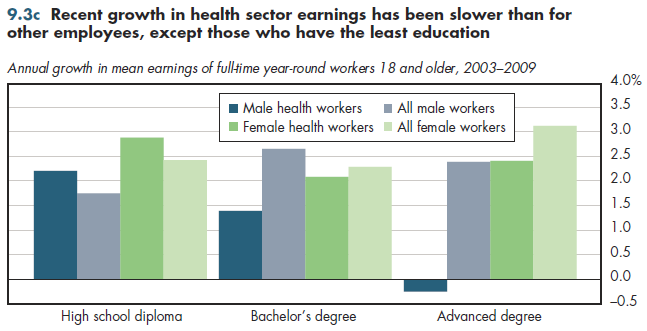Of those who work in the health industry, 75 percent of men and 50 percent of women have at least a college degree (figure 9.3a). Conversely, compared with the work force in general, a much lower share of health sector workers have less than a high school diploma or have graduated only from high school without any additional schooling. In the general economy, increased education of the work force has been an important source of growth in output. That is, higher levels of education have tended to contribute to productivity growth. Thus, low productivity growth in health care exists despite high levels of worker education.

Earnings tend to rise with educational attainment. Compared with males whose highest level of education is a high school diploma, male health workers who have a bachelor's degree have average annual incomes that are twice as high. Males who have advanced degrees earn five times as much as high school graduates (figure 9.3b).

Many labor economists believe that individuals who have higher education levels earn more because they produce more. Education brings more skill and knowledge to the individual. A more educated person can perform several different tasks and has greater awareness of other job opportunities. A contrary view maintains that high school diplomas and college degrees are credentials, useful for hiring but not necessarily for measures of what people actually produce on the job, when hired. To an employer, a person who has a degree might seem well motivated and reliable, that is, likelier to have characteristics considered desirable in an employee than an equivalent individual who has no degree. In a heavily regulated industry such as health care, credentialing might have as much to do with professional rent-seeking behavior as it does with higher productivity. It is difficult to isolate a pure "education effect" on output because of the difficulty of measuring personal characteristics and because other attributes, such as experience, are closely related to education.
Whether it reflects lagging productivity or something else, recent growth in health sector earnings has been slower than for other workers (figure 9.3c).

Download PowerPoint versions of all figures.
Download Excel workbooks used to create
Figure 9.3a Table,
Figure 9.3b Table, and
Figure 9.3c Table.
[Note that you’d have separate links for each set of tables] Figures 9.3a, 9.3b, and 9.3c were created from the following tables (the workbook includes all supporting tables used to create these tables):
- Fig. 9.3a: Table 9.3.1. Percentage of Civilian Labor Force Aged Twenty-Five to Sixty-Four, by Educational Attainment, 2009
- Fig. 9.3b: Table 9.3.2. Mean Incomes of Workers 18 and Older Who Work Full-Time Year-Round in Health Industry, by Educational Attainment, 2009
- Fig. 9.3c: Table 9.3.3. Annual Growth in the Mean Income of Men 18 and Older Who Work Full-time Year-Round in Health Industry, by Educational Attainment, 2003-2009
- Department of Commerce. Bureau of the Census.












